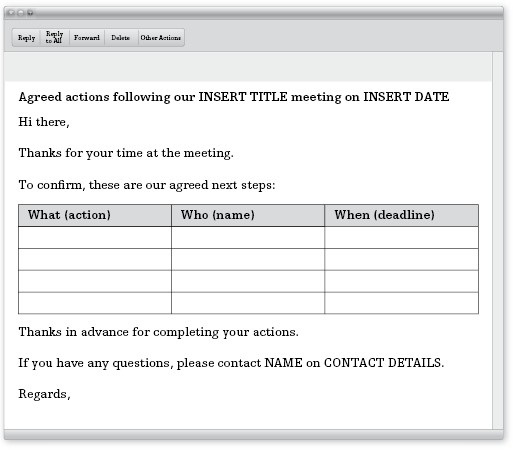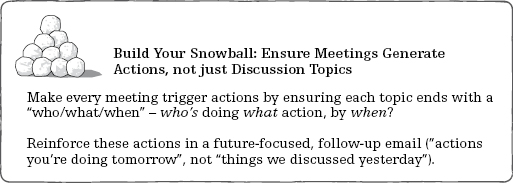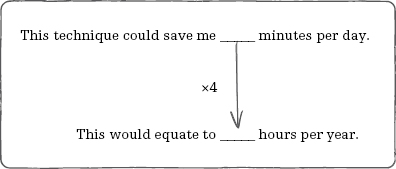10
When you want to ensure meetings generate actions, not just discussion topics
Some meetings are little more than glorified chats. Lots discussed, but not one action arising. These are a drain on your time – especially if they happen every week. Team updates, anyone?
To resolve this, you can:
- Keep the content the same, or change it; and/or
- Keep the duration the same, shorten it, or just stop having the meeting.
In my experience, the worst option is usually to keep both content and duration the same. After all:
- If you waste an hour every week at meetings like this, stopping them would save you one week per year (to remind yourself how I worked this out, please see this section’s introduction).
- Therefore, if these meetings involve say 26 people, stopping them would free up 26 working weeks – that’s half an employee! – for no cost or hassle. Even better, none of you would have to waste time in this rubbish meeting any more.
Turning Discussions Into Actions
You might well still want/need to meet for at least some time. So, to make things more effective, identify how to take less time to trigger more actions.
Here’s one simple solution: after every discussion topic, ask questions to identify the action to take, focusing on three key elements – who’s doing what, by when. For example:
- Who:
- “Which of us should take an action, to move this forward?”
- “Who’s responsible for progressing this?”
- What:
- “What action should we take as a result of this conversation?”
- “What are our next steps here?”
- When:
- “What’s the deadline for this action?”
- “When do you want to update us on your progress?”
You’ll notice these questions don’t appear much in update meetings. That’s one reason they can be so dull, pointless and an unrelenting drain on your time. The next chapter shows how to transform these into action-generating sessions.
But with updates – or indeed any meeting – unless you ask questions like these, people won’t be clear on their actions.
And, when actions aren’t clear, they don’t happen.
Making Success Inevitable
However, even if you are clear on your actions, they still might not happen. Work sure does have a habit of getting in the way.
So document the actions (what’s happening next) – not the minutes (what was discussed) – and send a follow-up email. Something like:

Tips like this really work. I was recently discussing “Meetings” with one of my customers, Debbie Harrison (Debbie specializes in learning, leadership and talent development, and has helped some of the world’s largest companies revolutionize their people’s abilities and motivation). She’s used my techniques to overhaul how various companies conduct their meetings. She told me it always improves things, the main benefits being:


